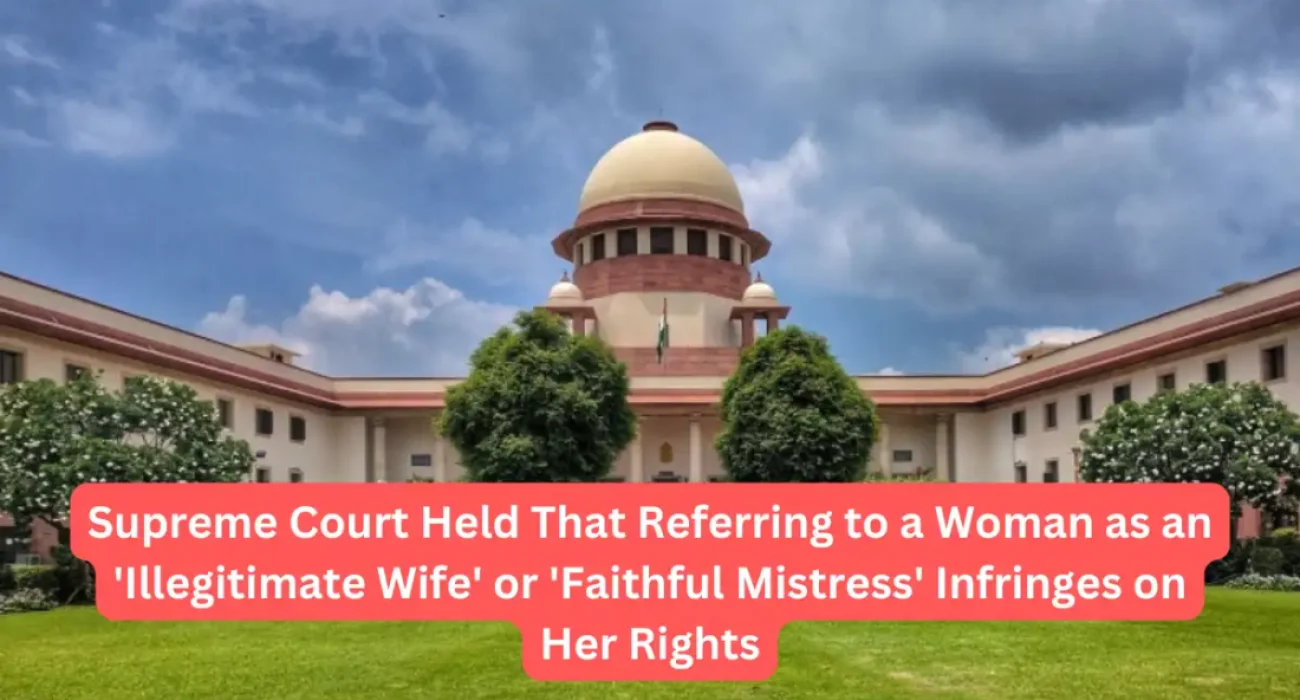

Table of Contents
ToggleThe case before the Supreme Court involved a judgment by the Bombay High Court wherein the High Court referred to a woman whose marriage had been declared void as an “illegitimate wife” or “faithful mistress.” The controversy arose when the woman sought permanent alimony after her marriage was declared void under Section 11 of the Hindu Marriage Act, 1955 (HMA). The Bombay High Court’s characterization of her in this derogatory manner raised concerns about the violation of her fundamental rights and dignity. The matter was then taken to the Supreme Court for adjudication.
The petitioner challenged the Bombay High Court’s characterization of her as an “illegitimate wife” and a “faithful mistress.” She argued that such language not only violated her dignity but also went against the constitutional principles of equality and non-discrimination. The petitioner emphasized that the use of such terms was discriminatory, misogynistic, and degrading, particularly since similar language was not used for the husband in the void marriage. She contended that these terms were a direct violation of her rights under Article 21 of the Constitution of India, which guarantees the right to live with dignity.
The respondent, in defense of the Bombay High Court’s judgment, argued that the terms used to describe the woman were within the scope of legal proceedings, where the focus was on the nature of the marriage being void. The respondent believed that the Court’s use of such terms was merely descriptive and not intended to demean the woman. The respondent further maintained that the legal status of the marriage as void did not affect the woman’s rights to claim alimony or maintenance.
The Supreme Court, consisting of Justices Abhay S. Oka, Ahsanuddin Amanullah, and Augustine George Masih, observed that calling a woman an “illegitimate wife” or “faithful mistress” was not only inappropriate but also against the fundamental rights guaranteed under Article 21 of the Constitution. The Court stated, “Calling a woman an ‘illegitimate wife’ or ‘faithful mistress’ will amount to a violation of the fundamental rights of that woman under Article 21 of the Constitution of India. Describing a woman by using these words is against the ethos and ideals of our Constitution.” The Court pointed out that such language was misogynistic, reflecting a bias against women, and emphasized that similar adjectives were not used for men in void marriages, highlighting a gender disparity in the application of legal language.
Furthermore, the Court emphasized the importance of using respectful and neutral language in legal proceedings, particularly when addressing women. It noted that the Bombay High Court’s judgment not only undermined the woman’s dignity but also propagated harmful gender stereotypes, which had no place in modern legal interpretations. The Court made it clear that the use of derogatory language towards a woman, especially in a legal context, could never be justified under the Constitution.
The Supreme Court categorically stated that a spouse whose marriage has been declared void under Section 11 of the Hindu Marriage Act, 1955, is entitled to seek permanent alimony or maintenance from the other spouse under Section 25 of the HMA. The Court ruled that such a claim could be made irrespective of whether the marriage was void. The Court took the opportunity to reject the Bombay High Court’s misogynistic language and noted that such expressions were not reflective of the constitutional values that India upholds. “The use of such words is misogynistic. The law laid by the Full Bench of the Bombay High Court is obviously not correct.” In doing so, the Supreme Court overruled the language used by the Bombay High Court and reinforced the right of individuals, regardless of the status of their marriage, to receive alimony.
Additionally, the Court addressed concerns related to interim maintenance, stating that even if a marriage was found to be void, the spouse could still be entitled to maintenance pending the final decision of the case, under Section 24 of the HMA. The Court noted that decisions regarding alimony should be based on the conduct of the parties involved and the facts of each case, with the ultimate aim of ensuring that no individual is left destitute due to financial dependency.
Credits: Deeksha Rai
IAW resources
Browse our help directory